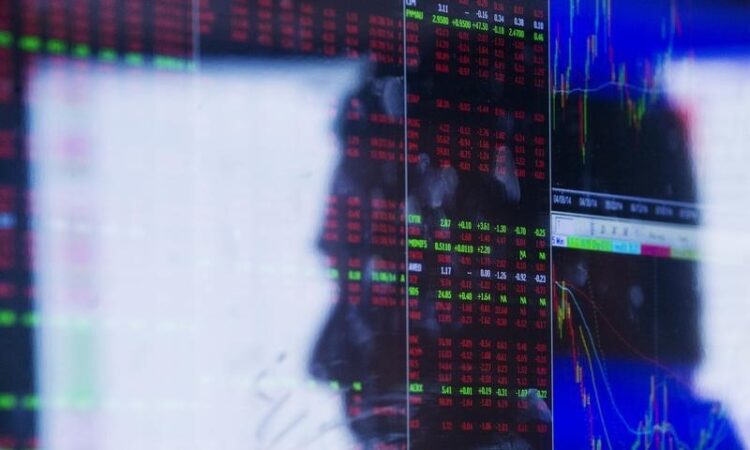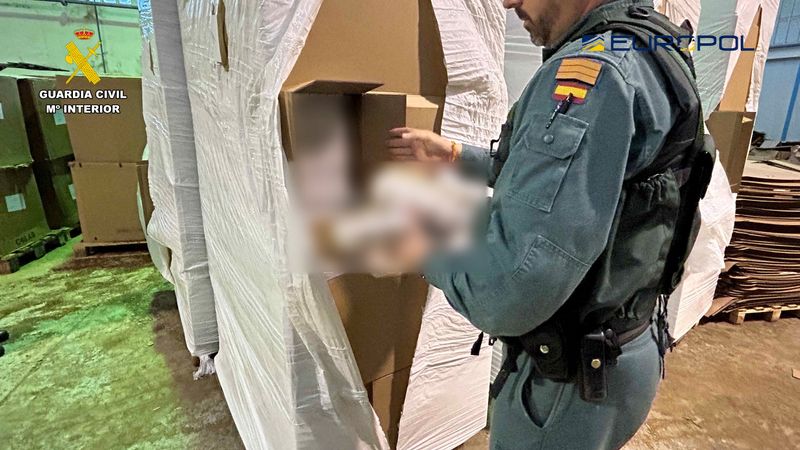

© Reuters. A Spanish Civil Guard officer handles material from boxes containing illegal tobacco during a raid where more than 3.5 million packets of contraband tobacco were seized, in Seville, Spain, in this picture released on January 22, 2023. Guardia Civil/Handou
2/4
By Richa Naidu, Emma Pinedo and Emilio Parodi
MADRID (Reuters) – Spanish police raided three clandestine tobacco factories early this year, seizing nearly 40 million euros ($44 million) worth of tobacco leaf and illicit cigarettes.
At one, in the northern town of Alfaro, they found 10 Ukrainian workers, five of them war refugees, who’d been put to work with no contracts and scant pay, police said. They worked all day for and lived at the factory, forbidden from leaving.
This operation is one of dozens across the EU that regional policing and anti-fraud agencies say have driven seizures of illicit cigarettes to record levels.
Crime groups, which have traditionally mainly sourced fake tobacco products from outside the EU, are increasingly setting up production facilities in western Europe to be closer to higher-priced markets, according to Reuters interviews with half a dozen specialists in the field, including enforcement officials, tobacco executives and industry analysts.
The trend was revved up by the travel shutdown of the COVID-19 pandemic, which choked supplies from outside the bloc, the European Anti-Fraud Office (OLAF) said. It may have been further accelerated by the war in Ukraine, which for years has been a production hub and transit route for illicit tobacco, OLAF added.
As well as the human cost, counterfeiting is a financial thorn in the side of the world’s biggest tobacco companies at a time when they’re facing a global decline in smoking that’s spurred large investments in alternative products like vapes.
“Criminal gangs have switched from importing counterfeit products into Europe to establishing illicit manufacturing facilities within EU borders,” said Cyrille Olive, British American Tobacco (NYSE:)’s (BAT (LON:)) regional head of anti-illicit trade.
BAT – one of tobacco’s global giants with Imperial Brands (OTC:), Japan Tobacco (OTC:) and Philip Morris International (NYSE:) – has seen increased counterfeiting since last year in France, the Netherlands, Portugal, Slovenia, Denmark and the Czech Republic, Olive added.
Some campaigners have accused Big Tobacco of overstating the size of the illicit market to help lobby against higher taxes – something the companies deny. Nonetheless, the latest data shows seizures of illicit cigarettes are increasing.
A record 531 million illicit cigarettes were impounded across the EU last year, a rise of 43% from the roughly 370 million seized in 2020, according to data from OLAF. About 60% of the cigarettes were from illicit production in the bloc while the rest were smuggled in.
Europol told Reuters that last year would also likely set a record for the number of illegal cigarette factories that were reported shut down by national police forces, although the full-year data isn’t yet available.
TOBACCO INVESTIGATORS
The industry has responded by hiring investigators to research illicit operations and share intelligence with European authorities, executives at Japan Tobacco, BAT and Imperial Brands told Reuters.
The three tobacco majors declined to put a figure on the financial hit from the illicit trade. Japan Tobacco has, though, spent “hundreds of millions of dollars” gathering information on the counterfeiters which it then passes on to European authorities like OLAF, according to Vincent Byrne, head of the company’s anti-illicit trade operations.
“We have a dedicated function within the company to try and protect our assets, protect our brands, and combat illegal trade,” said Byrne, a former detective who investigated organised crime in Ireland.
BAT and Imperial Brands said they also had intelligence operations.
Philip Morris International declined to comment for this article.
PACK: LESS THAN A EURO TO MAKE
Counterfeiters typically replicate popular cigarette brands, which include Japan Tobacco’s Winston, Philip Morris’ Marlboro, British America’s Dunhill and Imperial Brands’ Nobel.
A packet of 20 cigarettes costs less than a euro to make, said Byrne, but trades at several times that, depending on the marketplace.
Supplies from China and other parts of Asia – which used to be the biggest sources of counterfeit cigarettes that ended up in the EU – shrank during COVID-19 lockdowns, spurring increasing production in Europe itself, according to Alex McDonald, head of group security at Imperial Brands.
Russia’s invasion of Ukraine may have quickened that trend, said Ernesto Bianchi, OLAF’s director of revenue and international operations, investigations and strategy, adding that the agency was “analysing how the fraudsters may have reconfigured their routes”.
Ukraine had been a hub for the manufacturing of illicit tobacco and a supply route for illicit and counterfeit cigarettes made in Russia and Belarus, activities that may have been disrupted by the war, Imperial Brands’ McDonald said.
Some counterfeiters are luring and coercing Ukrainian refugees to be workers.
An illegal tobacco factory was dismantled last month in Roda de Ter, 80 km from Barcelona, Spanish police said on Thursday. Officers seized 11,400 kilos of tobacco and 7,360 packets of cigarettes. Six Ukrainians were found working there.
In Italy, officials said in April last year they had found about 82 tonnes of counterfeit cigarettes inside a factory in the industrial area of the country’s Pomezia municipality.
Investigators said they found Russian, Moldovan and Ukrainian workers doing gruelling shifts in an unsafe environment where walled-up windows stopped fumes escaping.
“A good many workers from Ukraine have been found in these illegal factories,” Japan Tobacco’s Byrne said about counterfeiting operations across the EU.
“They’re collected in a van at an airport, blacked out windows, driven around and swapped into another van,” Byrne, said recounting a particular incident.
“Eventually they’re delivered to the factory. Mobile phones are taken from them. Essentially, it’s a form of modern-day slavery.”
($1 = 0.9310 euros)





